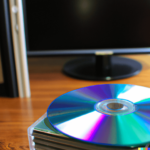How to Use DVDs and How they benefit us in real life?

DVDs, or Digital Versatile Discs, have been a staple in the entertainment industry for decades. They have proven to be a reliable source of high-quality video and audio content. Despite the rise of streaming services, DVDs are still used by millions of people worldwide. In this article, we will explore the benefits of using DVDs and how to get the most out of them.
What is a DVD?
A DVD is a type of optical disc that is used for storing digital data. It was introduced in 1995 as a successor to the CD (Compact Disc). DVDs are similar to CDs in shape and size but have a much higher storage capacity. A typical DVD can hold up to 4.7 GB of data, which is enough to store a full-length movie with high-quality video and audio.
DVDs are divided into different types based on their intended use.
The most common types of DVDs are:
- DVD-ROM: This type of DVD is used for storing data that can be read but not written to. It is commonly used for software installation and data backup.
- DVD-R: This type of DVD can be written to once and cannot be erased or re-recorded.
- DVD+R: This type of DVD is similar to DVD-R but is compatible with more DVD players.
- DVD-RW: This type of DVD can be erased and re-recorded multiple times.
- DVD+RW: This type of DVD is similar to DVD-RW but is compatible with more DVD players.
- DVD-RAM: This type of DVD is rewritable and can be used for data backup and video recording.
Now that we understand what DVDs are, let’s explore some of the benefits of using them.
Benefits of using DVDs
DVDs can be very handy in many situations. DVDs can contain Movies, Songs, Games, and maybe some Random Family footage. Let’s go through the benefits of using DVDs.

- High-quality video and audio: DVDs offer high-quality video and audio content that is superior to what most streaming services provide. DVDs have a higher bit-rate, which means that more data can be stored on them, resulting in a higher-quality image and sound.
- No internet connection required: DVDs do not require an internet connection, which makes them a reliable source of entertainment in areas with poor or no internet connectivity. This is particularly useful when traveling, camping, or in rural areas.
- Easy to use: DVDs are easy to use and require minimal setup. All you need is a DVD player and a TV or computer screen, and you are good to go. Most DVD players come with a remote control, making it easy to navigate through the different features.
- Physical ownership: Owning a DVD means that you have a physical copy of the content, which can be satisfying for some people. It also means that you do not have to worry about the content being removed from a streaming service or becoming unavailable due to licensing issues.
- Special features: DVDs often come with special features, such as behind-the-scenes footage, deleted scenes, and commentary from the actors or directors. These features can enhance the viewing experience and provide additional insights into the production process.
How to get the most out of your DVDs

- Store them properly: DVDs should be stored in a cool and dry place away from direct sunlight. This will prevent them from getting scratched or damaged, which can affect the playback quality.
- Clean them regularly: DVDs can attract dust and fingerprints, which can affect the playback quality. To clean a DVD, gently wipe it with a soft cloth or use a DVD cleaning kit.
- Use a good quality DVD player: A good quality DVD player can enhance the playback quality and provide additional features such as upscaling. Look for a player that has a high bit-rate and is compatible with different types of DVDs.
- Explore the special features: DVDs often come with special features that can enhance the viewing experience. Take the time to explore these features and enjoy the behind-the-scenes content, commentary, and other extras that come with the DVD.
- Make backups: DVDs can get scratched or damaged over time, which can affect the playback quality. It’s a good idea to make a backup copy of your DVDs to ensure that you always have a working copy. You can use DVD copying software to make a backup copy of your DVDs.
- Use subtitles: DVDs often come with subtitles in different languages. If you are learning a new language or have difficulty hearing, using subtitles can be helpful. Most DVD players have a subtitle option that you can turn on or off.
- Take care of your DVD player: Your DVD player is an essential component of the DVD viewing experience. It’s important to take care of it by cleaning it regularly and avoiding using it for extended periods of time. This will help to ensure that your DVD player lasts for a long time and provides the best possible playback quality.
Final Words
In conclusion, DVDs are still a relevant and reliable source of entertainment in today’s digital age. They offer high-quality video and audio content, do not require an internet connection, and provide physical ownership of the content. By following these tips, you can get the most out of your DVDs and enjoy the special features and extras that come with them. So the next time you’re in the mood for a movie or TV show, consider popping in a DVD and enjoying the benefits that it has to offer.






